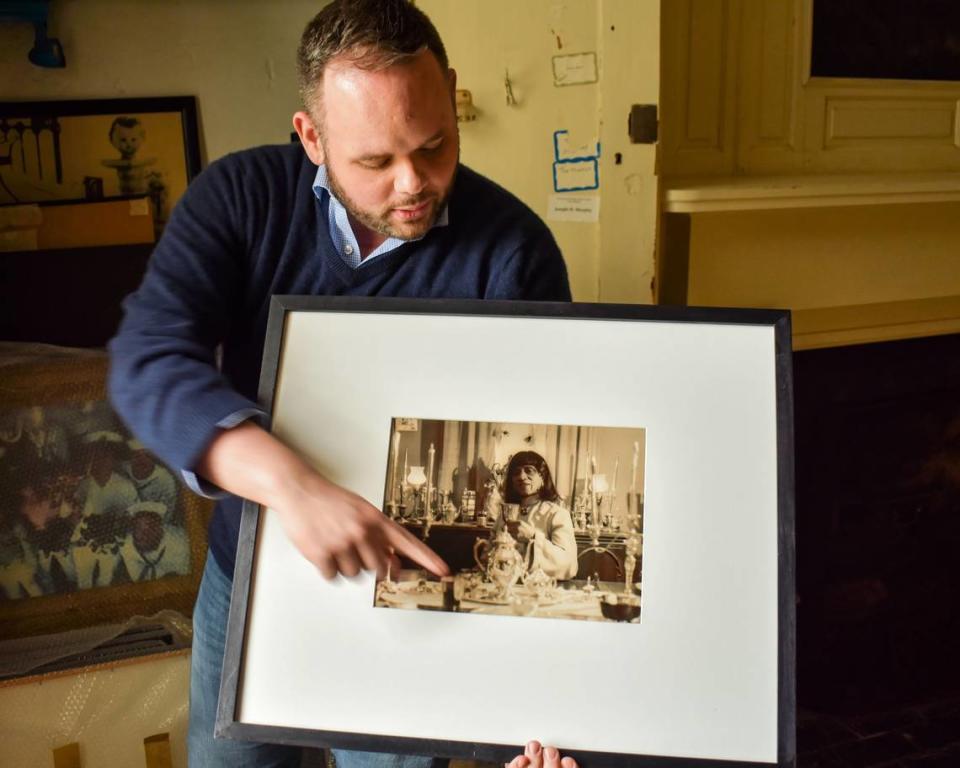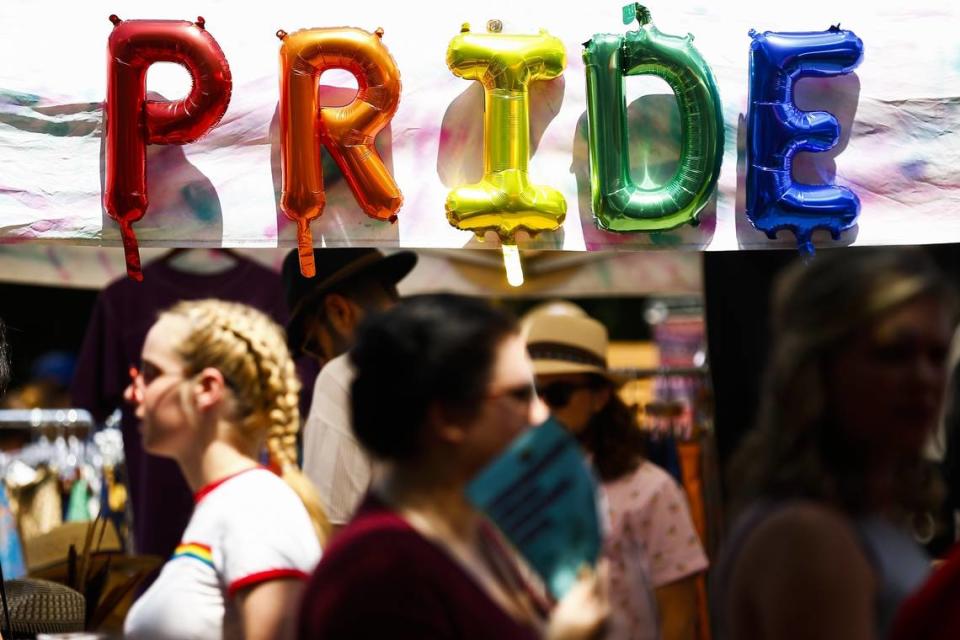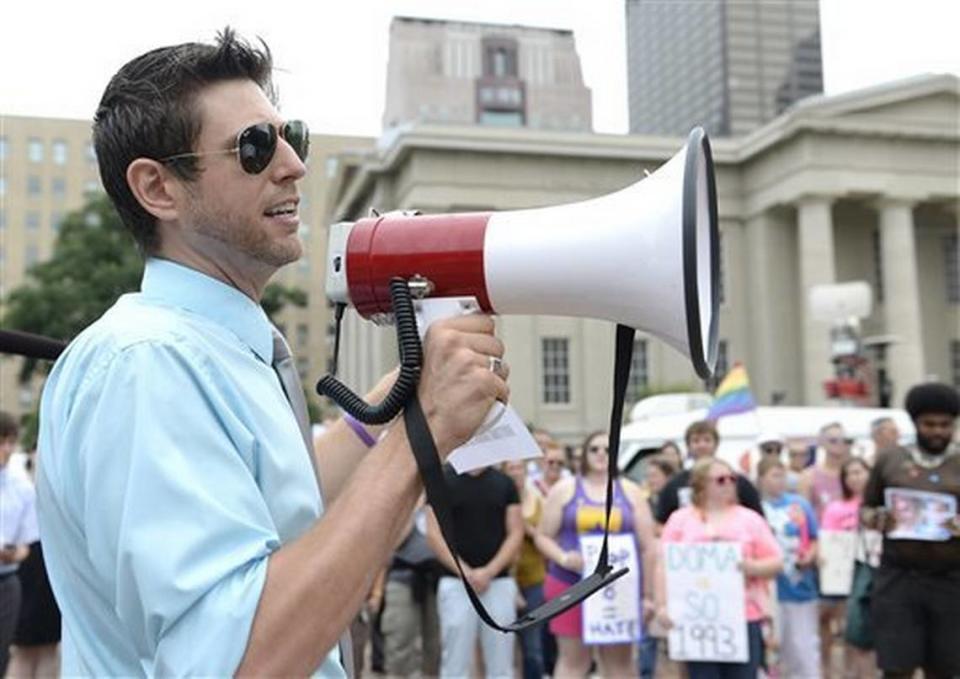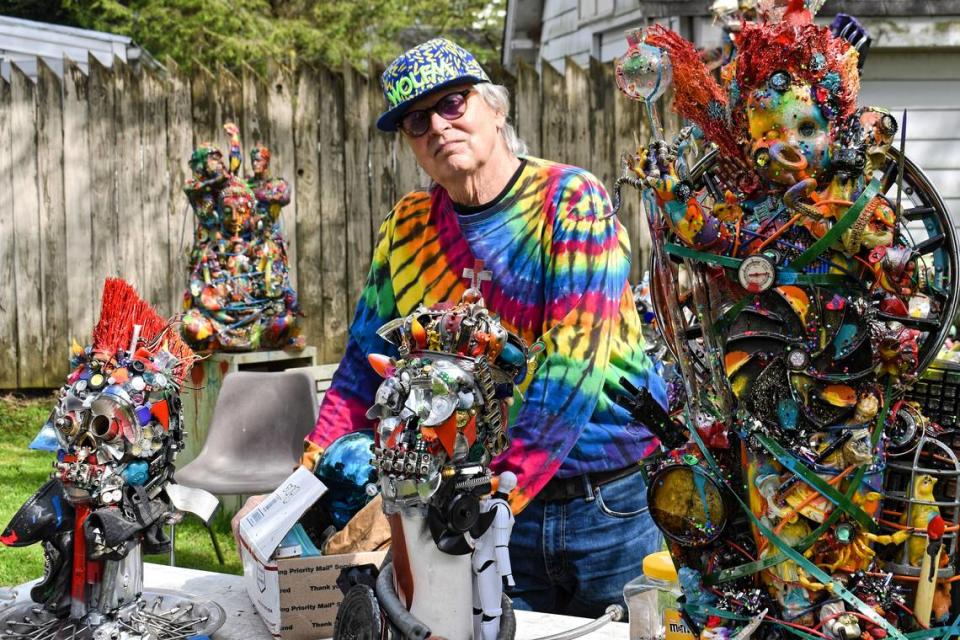‘We’ve always existed’: Celebrate Pride by looking back on Kentucky’s LGBTQ+ history
In our Uniquely Kentucky stories, Herald-Leader journalists bring you the quirky and cool, historic and infamous, beloved and unforgettable, and everything-in-between stories of what makes our commonwealth remarkable. Read more. Story idea? hlcityregion@herald-leader.com.
Kentucky is rich in LGBTQ+ history, but it’s not always easy to find.
Jon Coleman, the executive director of the Faulkner-Morgan Archive, an organization dedicated to preserving Kentucky’s gay history, has spent the past decade saving stories from Kentucky’s LGBTQ+ community.
“We are a bright thread in the rich tapestry of the history of the commonwealth,” he said.

“There is a queer history of Kentucky. It’s a history that we can know; it’s a history that we can learn more about. It’s a history that deserves to be integrated and celebrated just like any other community in Kentucky.”
This year marks the 25th anniversary since Louisville passed the first Fairness Ordinance in Kentucky, making discrimination based on gender identity or sexual orientation illegal.
Jeffery Jones, who wrote the first anthology of gay Kentucky back in 2001, said it’s nearly impossible to write a linear narrative of LGBTQ+ Kentucky history. Still, he said, the stories we have are worth being told.
Kentucky’s LGBTQ+ history is sprawling and deserves to be heard, he said.
“If you contribute to history, but no one remembers who you are, did you really contribute?” Jones said.
For every well known moment in Kentucky’s LGBTQ+ history, there is a story lurking in the shadows. As Jones put it, queer people “see through the mist,” but straight Kentuckians likely don’t know the real LGBTQ+ history of the commonwealth.

Here are some of Kentucky’s documented queer moments.
Kentucky’s first LGBTQ+ love story
The first documented gay love in Kentucky dates back to the Revolutionary War.
Soldiers Robert Craddock and Peter Tardiveau met during the war and became inseparable.
After fighting for independence, the pair spent the rest of their days living together on a farm near Bowling Green. Neither man ever married, and they were buried next to each other.
Craddock and Tardiveau are described in an article by Western Kentucky University founder T.C. Cherry as having a relationship that “persist from the day of meeting till the day of death.”
“He calls them queer,” Coleman said. “He very much romanticizes their relationship in many odd ways. They’re still buried together in Bowling Green Cemetery.”
The two soldiers’ story is the oldest documented example of LGBTQ+ love in Kentucky, but it is just the first of many.
One of the most prominent LGBTQ+ figures in Kentucky is Sweet Evening Breeze, or Sweets, a Black woman born in the late 1800s. There is still debate among historians about if Sweets would have called herself transgender or a drag queen.
Sweets was known to host “womanless weddings,” which were advertised in the local newspapers in the 1930s. A safe haven for cross dressing men, “womanless weddings” or “rainbow weddings” were theatrical wedding acts performed by all-male casts often used to raise money for local churches.
Fast forward a few decades to the 1970s, and the Lexington police were raiding gay bars, arresting cross dressers and entrapping people in well-known gay spaces.
“You see this pendulum swinging back and forth,” Coleman said. “There’s notoriously this crackdown on queer expression. Things that had been tolerated in the past are longer being accepted.”
Notable court battles
Two men in Caldwell County, C. H. Poindexter and Frank Moore, were charged with sodomy in 1909. They pleaded guilty and were sentenced to two years in prison, but their attorney fought back.
“Their lawyer makes the argument that they were not actually in fact committing sodomy — the assumption being that they’re having oral sex,” Coleman said.
They appealed the charges, and the defense held. Both men were acquitted on the charges. Coleman said there are few cases so early in Kentucky’s history that “so clearly have a homosexual bend to them.”
In 1962, the Kentucky law was updated to include oral sex in the definition of sodomy.
That same year, Illinois became the first state to decriminalize homosexuality. Other states followed, and gay liberation seemed to be on the come up.
“We were marching in the streets against the Vietnam war. We were smoking marijuana and listening to rock and roll music. We wanted to change the whole world, not just the gay world,” LGBTQ+ activist Bob Morgan said.
Then AIDS hit.
As the community endured heartbreaking losses, hate poured in and many families were torn apart, but LGBTQ+ advocates were determined to live their lives out loud.
“It reinvigorated the political scene of gay culture. People were determined to fight for gay rights, fight for gay marriage, without any reservation,” Morgan said. “It brought together all the initials — LGBTQ. Before that, the gay movement was horribly fragmented.”
In 1992, Kentucky became the first state to decriminalize homosexuality after the AIDS crisis.
With the decision in commonwealth v. Wasson, Kentucky declared its consensual sodomy laws unconstitutional.
Defense lawyers argued that state’s sodomy laws violated people’s right to privacy and infringed on equal protection guarantees. Eleven years later, the U.S. Supreme Court followed in suit.
“Using the very same two-pronged argument that’s used in the Wasson case, developed by Kentucky lawyers Kentucky queer activists, the U.S. Supreme Court will find consensual sodomy laws to be unconstitutional across the nation,” Coleman said.
The Supreme Court legalized same-sex marriage across the country, on June 26, 2015, with the decision in Obergefell v. Hodges. In that case, same-sex couples from Kentucky, Ohio, Michigan and Tennessee sued their relative state agencies to challenge same sex marriage bans.
Kentucky made national headlines after that decision when Rowan County Clerk Kim Davis refused to issue marriage licenses to same-sex couples because of her “religious beliefs.”
Though homosexuality is no longer illegal and gay marriage is recognized in all 50 states, there is still no statewide law protecting Kentucky’s LGBTQ+ community from discrimination.
Louisville passes KY’s first Fairness Ordinance
It took eight years of grassroots organizing to pass the first local ordinance protecting the LGBTQ+ community from discrimination in Kentucky in 1999. Twenty-five years later, 24 cities in the commonwealth have comprehensive protections for the LGBTQ+ community.
“Discrimination was happening to people and there was no legal recourse,” Jones said. “It was basically to say, as a city we will treat you equally and everyone is welcome here.”
Comprehensive ordinances protect from discrimination in all three areas of civil rights law - housing, employment and public accommodations.
Louisville passed a partial fairness ordinance in January 1999 protecting against housing discrimination. Lexington followed shortly after, passing the state’s first comprehensive fairness ordinance in July of that year.
Louisville later expanded protections and is now considered to have a comprehensive ordinance. In fact, Louisville passed legal protections for trans people three years before New York City.
Along with the 24 comprehensive ordinances, there are two partial ordinances in Kentucky, hailing protections in one or two of the civil rights areas.

Most of those ordinances were created with the help of the Fairness Campaign, a Kentucky organization aimed to broaden equality across the state.
“To have protections for trans gender folks at that time was against the national trend,” Fairness Campaign executive director Chris Hartman said. “Every fairness ordinance across the Commonwealth has included gender identity and are transgender inclusive. That is of the utmost importance.”
Today’s LGBTQ+ community
While there have been steps towards acceptance for LGBTQ+ Kentuckians, the work is not done. Hartman said the Fairness Campaign looks forward to the day Kentucky passes a statewide law protecting its queer citizens.
By documenting the past gay lives of Kentucky, today’s LGBTQ+ activists are keeping the door open for the future gay community to celebrate their roots and remember those who came before them.
Rural parts of the state lack LGBTQ+ visibility, Faulkner-Morgan Archive assistant executive director Josh Porter said, with most preserved stories hailing from Louisville or Lexington.
Minority communities also come up short with LGBTQ+ representation.

Morgan, 74, has lived through the swinging pendulum of LGBTQ+ acceptance in Kentucky. He has spent the better part of his life fighting for equality.
Through the ups and downs of Kentucky’s deeply rooted LGBTQ+ history, one thing remains clear: The community has always been here.
“It’s such a historic fact that we’ve always existed,” he said.
“The idea that all of this, especially the trans stuff, is something new that we’ve come up to try and destroy civilization is just (BS.) There’s documented evidence of all this going all the way back in recorded history.”


